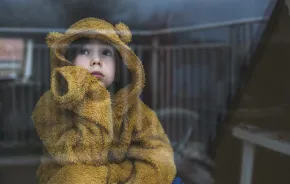 We’ve all heard it: those adorable verbal missteps small kids make when they’re trying to master the language. And, while “pasketti” instead of “spaghetti” may seem cute when a 2-year-old says it (another favorite: the color “lellow”), older kids who can’t express themselves clearly run the risk of being afraid to speak up in class or of being teased by peers.
We’ve all heard it: those adorable verbal missteps small kids make when they’re trying to master the language. And, while “pasketti” instead of “spaghetti” may seem cute when a 2-year-old says it (another favorite: the color “lellow”), older kids who can’t express themselves clearly run the risk of being afraid to speak up in class or of being teased by peers.
Getting the right treatment to help children speak clearly can help a young child academically and socially. But what about older kids who still struggle to pronounce the sounds correctly?
Older kids with speech problems often have trouble with lisps or with creating the sounds made by the letters th, r or l, says Wendy Bell, a speech and language pathologist at Seattle Children’s Hospital. Other kids might speak in a voice that’s too high, raspy or with “too much nasality,” she says.
Most parents notice these problems early on and seek treatment. This can be critical, since not all speech clarity issues improve on their own. Nine-year-old Jacob Bright’s mother, Jenny Bright of Bellevue, first noticed Jacob’s speech issues when he was 16 months old. Her pediatrician referred the Brights to early intervention therapies. Today, though Jacob’s speech has improved, he is still receiving speech therapy through the Bellevue School District.
Neicole Crepeau, Kirkland mother of Conrad (18) and Devon (14), also first noticed her children’s speech issues when they were very young. “Conrad had something of a lisp and didn’t pronounce his r’s clearly. Devon tended to slur his words, like he was talking too fast,” she says.
Some speech clarity issues are caused by physical problems, as was the case for Conrad. When he received braces and medical devices to move his jaw, his mother remembers, “The orthodontist told us it might improve his speech, and as it turned out, it did.”
But for Devon, practicing to speak more slowly has helped him improve his speech clarity. Crepeau and her husband worked with him at home, reminding him to slow down.
“We also devised sentences that had the sounds that he tended to slur and we had him try to say them clearly several times a day,” she says. Today, Devon’s speech is better. “If he gets tired, he gets lazy and slurs. But he seems to be more careful himself to try to speak clearly.”
Getting help
How can parents decide whether to call in the professionals to help their child’s speech? First, talk to your child’s pediatrician — he or she can refer you to a speech therapist if necessary. Treatments vary, depending upon the diagnosis.
Bell explains that while speech therapy may be all that is needed for a lisp, it might be necessary to check for “tongue thrust.” The resting position of the tongue can be important for developing the motions needed to correctly produce s and z sounds, says Bell.

But some speech issues don’t resolve as early as we’d like them to. Many kids still have trouble pronouncing certain sounds through the higher grade school years and into middle school. That’s when the social scene ramps up — and when kids who can’t pronounce their r’s or still have a lisp, for example, often get embarrassed. Some of the kids may even be bullied.
According to a Penn State University study, kids with speech issues experience a higher rate of bullying than other kids, particularly “relational bullying,” which means they get left out or publicly humiliated. Increasingly, speech and language pathologists are being trained to work with these children in the hope of reducing bullying, by using problem solving and role playing and encouraging children to speak up, according to the Penn State study.
Parents can also step in. At Jacob’s ninth birthday party, one of his friends asked Jenny Bright why he “spoke funny.”
“I told the boy that I had speech delays as a child and Jake inherited some of those from me. I also told him that as a friend of Jake, we should look out for each other, and if someone says something mean, to tell the teacher — or tell that person to knock it off.”
Crepeau feels her son Devon was actually motivated to improve his speech after encountering some teasing from peers. “Devon started practicing on his own … he took an interest in working on it because of those jokes from his friends.”
If you think your child’s speech is generating social problems for your child, ask yourself these questions, says Bell. “How does your child feel about the speech or communication difference? Is it getting worse? Have others commented negatively or expressed sincere concern?”
If your child is feeling embarrassed or awkward, or others have started to point out speech differences, speech therapy may be the best way to restore a child’s confidence. “Speech and vocal quality hold strong characteristics for identification and personality,” Bell says. “I’m a strong advocate for getting kids the services they need.”
Jessica Minier Mabe is a private tutor and writer. Her work is featured on her award-winning blog. She lives with her partner and their three children.
RESOURCES
American Speech-Language-Hearing Association
This website provides general information about speech clarity issues for all ages, as well as providing a database of speech therapy providers.
Seattle Children’s Speech and Language Program
Myofunctional Clinic of Bellevue
Myofunctional treatment may help with some of the physical causes of speech clarity issues.
Seattle Public Schools’ information on IEPs
This Web page provides a walk-through of the individual education plan process for Seattle school district students, including resources for parents with children in private schools.











